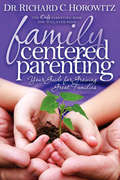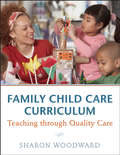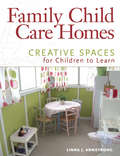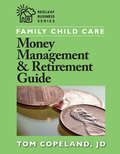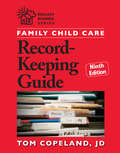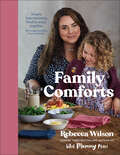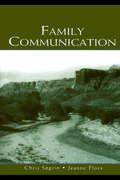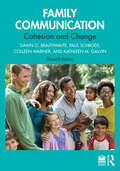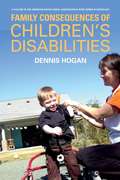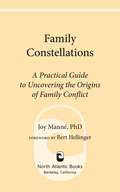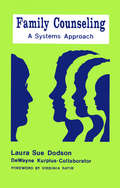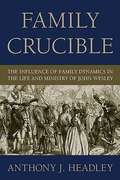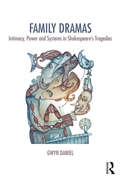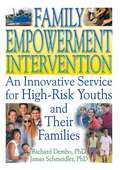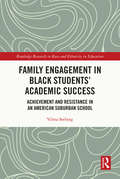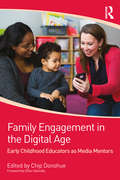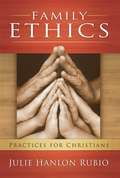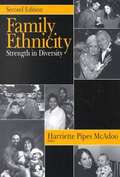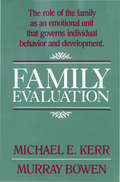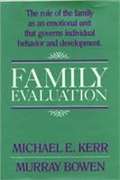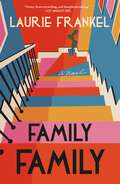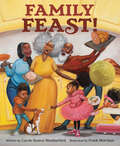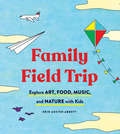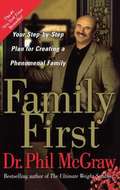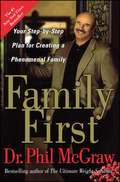- Table View
- List View
Family Centered Parenting: Your Guide for Growing Great Families
by Richard C. HorowitzChildren don’t arrive with an instruction book. Raising children and providing for their physical as well as emotional needs is a difficult job for which we receive little training. It should not be surprising that parenting has become isolating, frustrating and often robs both parent and child of the joy and satisfaction of this critical life experience. We often approach parenting reflexively, relying on what we learned form how we were parented. "Family Centered Parenting" offers families a model which will help parents develop a parenting style that reflects their unique values while providing guidelines, strategies and specific tools necessary to make thoughtful decisions about their parenting options. "Family Centered Parenting" is more than just a narrative, it contains real-life examples, dialogues and activities to help parents refine their skills and grow in confidence as they navigate the parenting journey. "Family Centered Parenting" is more a process than a program and is sufficiently flexible to be adapted to a variety of family situations--single parents, special needs children, gifted and talented children, blended families and ranges in age of children. "Family Centered Parenting" implementing effective communication principles, strategies to hold essential family meetings, discipline techniques that stress individual responsibility and information on responding to unique family needs. The ultimate goal of "Family Centered Parenting" is to create a family structure which is empowering to both parent and child and leads to a harmonious and joyful family life.
Family Child Care Curriculum
by Sharon Woodward200 fun and educational activities!A successful family child care (daycare) program promotes the healthy development of infants, toddlers, and preschool children in a caring, nurturing environment. Enrich your program and support children's early learning with best practices and activities designed specifically for family child care professionals.Family Child Care Curriculum includes a wealth of creative and inclusive activities that meet age-appropriate developmental objectives. Activities are organized both by age and developmental domain-physical and motor, cognitive, communication and language, and social and emotional-and complement the overall goals of a quality family child care program. These activities can be used with multiage groups of children and are easily implemented in your daily routine. This complete curriculum also includesFour developmental milestone charts describing typical development from birth through age fiveTips to provide quality learning environments and twenty-nine evaluation questions to improve your programSuggestions to create successful partnerships with familiesAdditional resources to help you develop a well-rounded program, including safety information and daily schedules
Family Child Care Homes
by Linda J. ArmstrongCreate a warm and inviting place where children feel at home.Discover the many ways your home can provide comfortable places where children love to learn and love to be. Filled with no- and low-cost ideas, this book demonstrates many unique and practical possibilities for your home's indoor and outdoor spaces. Chapters are packed with colorful photographs and provide examples and tips for designing learning zones, selecting items, organizing materials, and more. Checklists, resources, and questions are included to help you evaluate your setting, implement changes, and create a place that feels like a second home to the children in your care.
Family Child Care Money Management and Retirement Guide
by Tom CopelandFamily child care business owners will learn how to reduce their expenses and earn more money, handle special financial situations, and understand the basic principles of retirement planning, whether just starting out or an experienced provider.
Family Child Care Record-Keeping Guide, Ninth Edition
by Tom CopelandFor home-based family child care (daycare) providers, taking care of the children is only half of the job. The other half is taking care of the business--tracking expenses, being profitable, filing taxes, and meeting government requirements. This resource covers everything family child care providers need to keep accurate business records. If a family child care provider pays close attention to the recommendations in this book, he or she will be able to claim the maximum allowable deductions and pay the lowest possible federal taxes.Since the previous edition of Family Child Care Record-Keeping Guide, Congress and the IRS have made many changes to tax rules that affect family child care providers. There have been changes in depreciation rules, adjustments to food and mileage rates, and clarifications on how to calculate the Time-Space percentage. Author Tom Copeland has been involved in many IRS audits and represented providers in several Tax Court cases that have also clarified numerous rules. Further necessitating this ninth edition, the IRS issued two significant new rules in 2013. These updates, new rules, and clarifications are detailed in this book; all of the information is applicable to child care providers in every state, regardless of local regulations.Tom Copeland, JD, is a writer, trainer, lawyer, and consultant focusing on family child care business issues. He has conducted record-keeping, tax preparation, and business workshops for family child care providers across the country since 1981.
Family Comforts: Simple, Heartwarming Food to Enjoy Together (What Mummy Makes)
by Rebecca WilsonAn essential family cookbook for every home, let Rebecca Wilson show you how to cook just once for the entire family, giving you more time together around the table. Discover brilliant breakfasts, quick-cook snacks, and midweek meal ideas prepared in a matter of minutes. Enjoy simple home-cooked food, delicious bakes and family treats for big smiles and full tummies. The author of the bestselling cookbook, What Mummy Makes, brings you an easy-to-follow family recipe book that gives you the confidence to cook nutritious meals the whole family will love: • Over 100 comfort food recipes that you can rely on • Nutritionist-approved meals that are irresistible for all the family • Adaptations to suit your family&’s dietary needs available for every recipe for Gluten Free, Egg Free, Dairy Free, Vegetarian & Vegan diets • Weaning advice for parents and carers of babies from 6 months old • Handy tips and tricks for food preparation and storage for batch-cooking so as you can spend less time in the kitchen and more time with your loved ones Family Comforts is the ultimate comfort cookbook and baby-led weaning book in one; taking the stress out of mealtimes by cooking just once with dishes suitable for babies, that are also irresistible for older siblings and adults too. Cook nutritional meals with confidence that kids will love, Rebecca Wilson&’s recipes deliver big flavors with minimal effort all year round for even the toughest critics at the table with hidden-veg heroes and warming slow-cooker meals for busy parents and carers. From the award-winning author, Instagram sensation, and mom behind the phenomenally popular family food account @rebeccawilsonfood.
Family Communication: Chris Segrin (Lea’s Communication Series)
by Chris Segrin Jeanne FloraFamily Communication carefully examines state-of-the-art research and theories of family communication and family relationships. In addition to presenting cutting-edge research, it focuses on classic theories and research findings that have influenced and revolutionized the way scholars conceptualize family interaction. This text offers a thorough and up-to-date presentation of scientific research in family communication for both teachers and students of family communication as well as professionals who work with families.<P><P> This second edition features:<P> * Chapters updated with the latest research, including over 2000 references.<P> * Material on understudied family relationships, such as extended family relationships and gay and lesbian relationships<P> * Recent research on understudied topics in family communication, including the influence of technology on mate selection, negotiating work and family stress, single parenting, cohabitation, elder abuse, forgiveness in marriage, and the links among communication, culture, and mental health.<P> * A revised chapter on parent-child communication, taking a lifespan perspective that helps organize the large body of research in this area.<P> * A new chapter devoted to extended family relationships, with special focus on grandparent-grandchild relationships, in-law relationships, and adult children and their parents.<P> * An expanded review of family conflict processes, especially in relation to decision making and power.<P> A companion website provides chapter outlines, exam questions, and PowerPoint slides for students and instructors. Undergraduate readers should find the information easy to understand, while advanced readers, such as graduate students and professionals, will find it a useful reference to classic and contemporary research on family communication and relationships.
Family Communication: Cohesion and Change
by Dawn O. Braithwaite Kathleen M. Galvin Paul Schrodt Colleen WarnerNow in its eleventh edition, Family Communication: Cohesion and Change continues to provide students with a foundational, accessible, and inclusive overview of the family communication field.The eleventh edition represents the plurality of today’s families, helping students see themselves and think through how the up-to-date research and theory apply to their lives. It features a more concise narrative with streamlined key concepts that are more straightforward and engaging for students. Now presented in three sections, Communication and Family Lenses, Communication and Family Cohesion, and Communication and Family Adaptability, this edition’s new features include learning objectives for each chapter, Family Portrait interviews with top scholars, a glossary of key definitions, and expanded Family Reflections discussion questions interspersed in the text.This book is ideal for undergraduate courses in family communication, allied subjects in communication studies, family studies, nursing, and social work programs.The accompanying Instructor and Student Resources provide free digital materials designed to test students’ knowledge and save instructor time when preparing lessons. Please visit www.routledgelearning.com/familycommunication for interactive activities, practice quizzes, and more.
Family Consequences of Children’s Disabilities
by Denis P. HoganThe Americans with Disabilities Act (ADA) and other national policies are designed to ensure the greatest possible inclusion of people with disabilities in all aspects of American life. But as a matter of national policy we still place the lion's share of responsibility for raising children with disabilities on their families. While this strategy largely works, sociologist Dennis Hogan maintains, the reality is that family financial security, the parents' relationship, and the needs of other children in the home all can be stretched to the limit. In Family Consequences of Children's Disabilities Hogan delves inside the experiences of these families and examines the financial and emotional costs of raising a child with a disability. The book examines the challenges families of children with disabilities encounter and how these challenges impact family life. The first comprehensive account of the families of children with disabilities, Family Consequences of Children's Disabilities employs data culled from seven national surveys and interviews with twenty-four mothers of children with disabilities, asking them questions about their family life, social supports, and how other children in the home were faring. Not surprisingly, Hogan finds that couples who are together when their child is born have a higher likelihood of divorcing than other parents do. The potential for financial insecurity contributes to this anxiety, especially as many parents must strike a careful balance between employment and caregiving. Mothers are less likely to have paid employment, and the financial burden on single parents can be devastating. One-third of children with disabilities live in single-parent households, and nearly 30 percent of families raising a child with a disability live in poverty. Because of the high levels of stress these families incur, support networks are crucial. Grandparents are often a source of support. Siblings can also assist with personal care and, consequently, tend to develop more helpful attitudes, be more inclusive of others, and be more tolerant. But these siblings are at risk for their own health problems: they are three times more likely to experience poor health than children in homes where there is no child with a disability. Yet this book also shows that raising a child with a disability includes unexpected rewards—the families tend to be closer, and they engage in more shared activities such as games, television, and meals. Family Consequences of Children's Disabilities offers access to a world many never see or prefer to ignore. The book provides vital information on effective treatment, rehabilitation, and enablement to medical professionals, educators, social workers, and lawmakers. This compelling book demonstrates that every mirror has two faces: raising a child with a disability can be difficult, but it can also offer expanded understanding. A Volume in the American Sociological Association's Rose Series in Sociology
Family Constellations: A Practical Guide to Uncovering the Origins of Family Conflict
by Joy Manne Bert HellingerMapping out a "family constellation," explains Dr. Joy Manné, encompasses exploring previous powerful life events from accidents to adoptions and accessing the deepest dynamics in that family system. This process helps us recognize and then resolve deeply seated family patterns. For example, in order to understand a person's inability to trust, the family history of betrayal must be uncovered and released. These insights replace resentment with respect, pain with understanding.Dr. Manné uses the knowledge gained from her own practice as well as her educational experiences with Bert Hellinger, the founder of Family Constellations therapy, to clearly describe this technique. Most family constellation sessions are carried out in a group setting, with the facilitator first seeking clarity regarding the issue or problem the client has come to work out. Representatives are then chosen from among the group and the constellation is set up and worked in until it comes to resolution. This may be followed by a closing ritual and advice about how to integrate what the constellation has revealed. Through the use of real-life examples of family constellations, Dr. Manné makes this increasingly popular practice understandable and relatable.
Family Counseling: A Systems Approach
by Laura Sue Dodson DeWayne J. KurpiusFirst published in 1977. Routledge is an imprint of Taylor & Francis, an informa company.
Family Crucible: The Influence Of Family Dynamics In The Life And Ministry Of John Wesley
by Anthony J. HeadleyThis book explores the life and ministry of John Wesley from the perspective of Murray Bowen's Extended Family Systems Theory and to a lesser extent from Alfred Adler's concept of family constellation. Throughout the book, the author uses concepts drawn from these theories to explore significant historical and pivotal events in the life of John Wesley. Beginning with family events prior to his birth, the author also explores his early family constellation, influential themes, factors shaping his ministry, and various relational issues, including his relationships with Sophy Hopkey, Grace Murray, and his marriage to Mary Vazeille. It concludes by drawing lessons from Wesley's life pertinent to today's ministers.
Family Dramas: Intimacy, Power and Systems in Shakespeare's Tragedies
by Gwyn DanielMost of Shakespeare’s tragedies have a family drama at their heart. This book brings these relationships to life, offering a radical new perspective on the tragic heroes and their dilemmas. Family Dramas: Intimacy, Power and Systems in Shakespeare's Tragedies focusses on the interactions and dialogues between people on stage, linking their intimate emotional worlds to wider social and political contexts. Since family relationships absorb and enact social ideologies, their conflicts often expose the conflicts that all ideologies contain. The complexities, contradictions and ambiguities of Shakespeare’s portrayals of individuals and their relationships are brought to life, while wider power structures and social discourses are shown to reach into the heart of intimate relationships and personal identity. Surveying relevant literature from Shakespeare studies, the book introduces the ideas behind the family systems approach to literary criticism. Explorations of gender relationships feature particularly strongly in the analysis since it is within gender that intimacy and power most compellingly intersect and frequently collide. For Shakespeare lovers and psychotherapists alike, this application of systemic theory opens a new perspective on familiar literary territory.
Family Empowerment Intervention: An Innovative Service for High-Risk Youths and Their Families
by Letitia C Pallone Richard Dembo Robert James SchmeidlerUse this important intervention to improve your practice with substance-using youths and their families!This vital book gives you a detailed review of a National Institute on Drug Abuse-funded, long-term clinical trial of the Family Empowerment Intervention (FEI). The subjects are youths who have been arrested and processed at the Hillsborough County Juvenile Assessment Center and their families. With information on the conceptual foundations and clinical practices of the intervention and an examination of its one-year and longer-term impact on these youths&’ recidivism and psychosocial functioning, Family Empowerment Intervention: An Innovative Service for High-Risk Youth and Their Families will help you provide better services to these difficult-to-serve clients.Bringing you up-to-date on all aspects of this unique intervention, this book: examines the pressing need for this kind of intervention gives you an essential overview of the FEI describes the selection process for subject involvement in the project and the methods of data collection used examines the FEI&’s impact on crime as well as its short- and long-term impact on and drug and alcohol use suggests ways to improve the FEIComplete with dozens of easy-to-understand tables and figures as well as five helpful appendixes, this well-referenced volume is essential reading for anyone working with this highly volatile population. Make it a part of your collection today!
Family Engagement in Black Students’ Academic Success: Achievement and Resistance in an American Suburban School (Routledge Research in Race and Ethnicity in Education)
by Vilma SeebergThis timely volume presents powerful stories told by Black families and students who have successfully negotiated a racially fraught, affluent, and diverse suburban school district in America, to illustrate how they have strategically contested sanctioned racist practices and forged a path for students to achieve a high-quality education. Drawing on rich qualitative data collected through interviews and interactions with parents and kin, students, community activists, and educators, Family Engagement in Black Students’ Academic Success chronicles how pride in Black American family history and values, students’ personal capabilities, and their often collective, proactive challenges to systemic and personal racism shape students’ academic engagement. Familial and collective cultural wealth of the Black community emerges as a central driver in students’ successful achievement. Finally, the text puts forward key recommendations to demonstrate how incorporating the knowledge and voices of Black families in school decision making, remaining critically conscious of race and racial history in everyday actions and longer term policy, and pursuing collective strategies for social justice in education, will help eliminate current opportunity gaps, and will counteract the master narrative of underachievement ever-present in America. This volume will be of interest to students, scholars, and academics with an interest in matters of social justice, equity, and equality of opportunity in education for Black Americans. In addition, the text offers key insights for school authorities in building effective working relationships with Black American families to support the high achievement of Black students in K-12 education.
Family Engagement in the Digital Age: Early Childhood Educators as Media Mentors
by Chip DonohueFamily Engagement in the Digital Age: Early Childhood Educators as Media Mentors explores how technology can empower and engage parents, caregivers and families, and the emerging role of media mentors who guide young children and their families in the 21st century. This thought-provoking guide to innovative approaches to family engagement includes Spotlight on Engagement case studies, success stories, best practices, helpful hints for media mentors, and "learn more" resources woven into each chapter to connect the dots between child development, early learning, developmentally appropriate practice, family engagement, media mentorship and digital age technology. In addition, the book is driven by a set of best practices for teaching with technology in early childhood education that are based on the National Association for the Education of Young Children (NAEYC) and Fred Rogers Center joint position statement on Technology and Interactive Media. Please visit the Companion Website at http://teccenter.erikson.edu/family-engagement-in-the-digital-age
Family Ethics: Practices For Christians
by Julie Hanlon RubioHow can ordinary Christians find moral guidance for the mundane dilemmas they confront in their daily lives? To answer this question, Julie Hanlon Rubio brings together a rich Catholic theology of marriage and a strong commitment to social justice to focus on the place where the ethics of ordinary life are played out: the family. Sex, money, eating, spirituality, and service. According to Rubio, all are areas for practical application of an ethics of the family. In each area, intentional practices can function as acts of resistance to a cultural and middle-class conformity that promotes materialism over relationships. These practices forge deep connections within the family and help families live out their calling to be in solidarity with others and participate in social change from below. It is through these everyday moral choices that most Christians can live out their faith-and contribute to progress in the world.
Family Ethnicity: Strength in Diversity
by Harriette Pipes McadooFamily ethnicity involves the unique family customs, proverbs, and stories that are passed on for generations. It covers Native American Indians, Native Hawaiians, Mexican American and Spanish, African American, Muslim and Asian American families.
Family Evaluation
by Michael E. Kerr Murray BowenThe concepts of Murray Bowen, one of the founders of family therapy and the originator of family systems theory, are brought together here in an integrative fashion. Michael Kerr (who worked with Bowen for many years) and Bowen propose that the enormously complex task of evaluating a clinical family can be orderly when it is grounded in family systems theory. Using family diagrams and case studies, the book is devoted to an elegant explication of Bowen theory, which analyzes multigenerational family relationships and conceptualizes the family as an emotional unit or as a network of interlocking relationships, not only among the family members, but also among biological, psychological, and sociological processes. Bowen's persistent inquiry and devotion to family observation, in spite of obstacles and frustrations, have resulted in a theory that has radically changed our ways of looking at all behavior.
Family Evaluation: The Role of Family as an Emotional Unit that Governs Individual Behavior and Development
by Michael E. Kerr Murray BowenMichael Kerr (who worked with Bowen for many years) and Bowen propose that the enormously complex task of evaluating a clinical family can be orderly when it is grounded in family systems theory. Using family diagrams and case studies, the book is devoted to an elegant explication of Bowen theory, which analyzes multigenerational family relationships and conceptualizes the family as an emotional unit or as a network of interlocking relationships, not only among the family members, but also among biological, psychological, and sociological processes. Bowen's persistent inquiry and devotion to family observation, in spite of obstacles and frustrations, have resulted in a theory that has radically changed our ways of looking at all behavior.
Family Family: A Novel
by Laurie Frankel“Not all stories of adoption are stories of pain and regret. Not even most of them. Why don’t we ever get that movie?”India Allwood grew up wanting to be an actor. Armed with a stack of index cards (for research/line memorization/make-shift confetti), she goes from awkward sixteen-year-old to Broadway ingenue to TV superhero.Her new movie is a prestige picture about adoption, but its spin is the same old tired story of tragedy. India is an adoptive mom in real life though. She wants everyone to know there’s more to her family than pain and regret. So she does something you should never do — she tells a journalist the truth: it’s a bad movie.Soon she’s at the center of a media storm, battling accusations from the press and the paparazzi, from protesters on the right and advocates on the left. Her twin ten-year-olds know they need help – and who better to call than family? But that’s where it gets really messy because India’s not just an adoptive mother…The one thing she knows for sure is what makes a family isn’t blood. And it isn’t love. No matter how they’re formed, the truth about family is this: it's complicated.
Family Feast!
by Carole Boston WeatherfordFrom the award-winning author and illustrator of Standing in the Need of Prayer comes a joyous picture book about an intergenerational Black family cooking a delicious feast and appreciating their quality time together.Aunts, uncles, cousins, all pitch in. Hustle, bustle in the kitchen.Catching up, shooting the breeze, sharing stories and recipes.When it comes to a family feast, it&’s all hands on deck! Big Ma and Pops have been up early in anticipation of everyone&’s arrival. Aunts, uncles, and cousins gather from all over to help prepare their big meal. Clanging pots, chopping vegetables, sharing recipes, and swiping little treats are part of the fun! After the cooking is done, all of the relatives come together to pray, eat, and enjoy their special moment as a family. Newbery Honor and Children's Literature Legacy Award winner Carole Boston Weatherford and Coretta Scott King Illustrator Award winner Frank Morrison deliver a heartwarming peek at the love and the chaos that ensue when a family comes together and connects through food.
Family Field Trip: Explore Art, Food, Music, and Nature with Kids
by Erin Austen AbbottWith more than 40 family-friendly cultural activities and adventures, Family Field Trip makes it easy to incorporate moments of learning and exploration into life with kids. In this engaging guide, parents and caretakers will find simple-to-follow ideas and tips for cultural experiences the whole family can enjoy, whether they are at home, exploring the neighborhood, or taking a vacation. Drawing on a range of popular experiential educational techniques—including Montessori, World Schooling, Forest Schooling, and more—Family Field Trip is the perfect handbook for any family with young children and an invaluable resource for raising kids who will grow into curious, well-rounded citizens of the world.• Gives parents the tools and inspiration to turn the world into a giant field trip full of opportunities to teach children cultural appreciation• Provides parents with easy ways to incorporate learning, adventure, and exploration into both travel and daily life• Tackles a range of lessons and topics without being prescriptive or overwhelmingBy exploring sites, languages, and foods of the world, Family Field Trip is an inspiring guide to raise globally minded kids who appreciate art, food, music, nature, and more.Activities include starting a supper club to introduce kids to the basics of cooking, having conversations that encourage empathy and cross-cultural understanding, designing fun scavenger hunts for any kind of museum, exhibit, or park, packing for trips with kids, and more.• Perfect for parents, grandparents, and caregivers who aspire to raise open-minded world citizens with good taste• A lovely book for the adventurous, travel-loving family• Great for readers who enjoyed How to Raise an Adult by Julie Lythcott-Haims, Atlas of Adventures by Rachel Williams, and Bringing Up Bebe by Pamela Druckerman
Family First: Your Step-by-Step Plan for Creating a Phenomenal Family
by Phil McgrawCynics will tell you that in our fast-paced society "family" is becoming obsolete. I'm here to tell you that that is not right, not even close. Family is even more important today than in generations past, and its erosion is unacceptable.
Family First: Your Step-by-Step Plan for Creating a Phenomenal Family
by Dr. Phil McGrawDo you feel that your family is not what it used to be, or what it has the potential to be? Do you worry that the parenting decisions you're making today may be scarring your child for life? Do you sometimes feel you are in a tug-of-war with the world over who will shape your child's values and beliefs?With Family First: Your Step-by-Step Plan for Creating a Phenomenal Family, Dr. Phil offers a new classic on family life—and gives parents real answers and a plan for being the most positive and effective parents possible. Starting right now, you can begin to make realistic choices and take day-to-day actions that can make your family phenomenal. You must decide that you will lead your family with strength and love and that peace and joy are not just for the people next door or on TV. They're for your family. In Family First, Dr. Phil gives it to parents straight: even in this fast-paced world your family should be the center of your life and your child's life. Parenting is the most important and noble act you will ever undertake, yet American families are threatened like never before from the inside as well as the outside—many of us fight too much, don't get involved enough in our children's lives, or get bogged down in life's daily struggles instead of keeping our eye on the big picture of our family's well-being. Dr. Phil has been working with families for over twenty-five years to help them repair the fissures that have fractured their home lives. In Family First, he provides a proven action plan to help parents determine the strengths and weaknesses of their parenting style. His seven tools for purposeful parenting cover the most important elements for any parent: parenting for success—for the purpose of raising cooperative, caring, and competent children. Exercises, scripts, assessments, solutions for specific problems, and precise directions for implementing the steps you need to take are all included in this landmark work. Dr. Phil shows parents how to make changes now—how to put a stop to your children's tantrums; talk to them about peer pressure or self-esteem; instill values like integrity, honesty, and respect for other people; and bring order back to your house. If you want your child to have a happy, fulfilled life, you must open your eyes to the crucial role you play in his or her development. Most importantly, Dr. Phil's new book offers you and your family hope—for a phenomenal home life now, and a productive, fulfilling future for your children. As Dr. Phil says, you are not just raising children, you are also raising adults, and everything you do today impacts what kind of adult your child will become. You are building the future.
